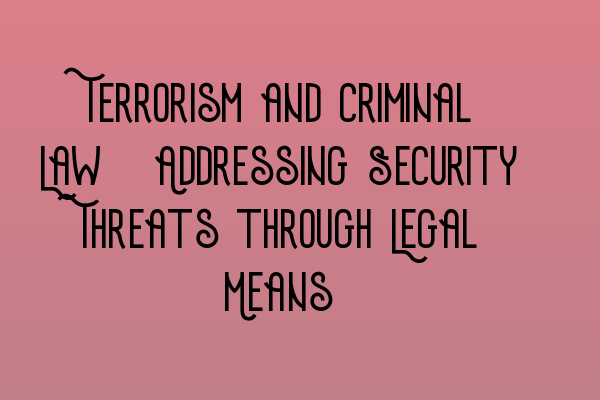Terrorism and Criminal Law: Addressing Security Threats through Legal Means
In a world challenged by increasing security threats, it is crucial to understand the role of criminal law in addressing these concerns. Terrorism, in particular, poses a significant danger to global peace and stability. Therefore, it is imperative to explore how legal means can be used to tackle such threats effectively.
The Definition of Terrorism
Terrorism is the deliberate use of violence, intimidation, or fear by individuals or groups to achieve their political, ideological, or religious objectives. This form of violent action aims to create a state of terror and panic within the affected population. It is essential to define terrorism accurately to enable efficient legal prosecution and prevention.
The Role of Criminal Law
Criminal law plays a vital role in combating terrorism and addressing security threats. It provides a framework within which acts of terrorism can be identified as crimes and individuals involved can be held accountable.
Legislation relating to terrorism typically covers offenses such as planning, preparation, financing, and carrying out acts of terrorism. Additionally, it encompasses measures to prevent and investigate such acts, ensuring the protection of citizens and national security.
Counter-Terrorism Measures
Governments around the world have implemented various counter-terrorism measures to protect their citizens and prevent future attacks. These measures involve a combination of legal, military, and intelligence strategies.
Law enforcement agencies are responsible for identifying potential threats, collecting evidence, and prosecuting individuals involved in terrorist activities. Effective investigation techniques, intelligence sharing, and international cooperation are indispensable for successfully combating terrorism.
Importance of Legal Expertise
Legal professionals, including solicitors and barristers, play a critical role in addressing terrorism through all stages of the criminal justice process. They provide legal advice, represent clients in court proceedings, and ensure fair trials.
It is essential for legal practitioners to possess a comprehensive understanding of terrorism laws, national and international legal frameworks, and human rights principles. This expertise enables them to navigate complex legal terrain and guarantee justice is served.
The Future of Counter-Terrorism
As the nature of terrorism evolves, legal frameworks and counter-terrorism measures must adapt accordingly. Policymakers need to strike a delicate balance between protecting national security and safeguarding individual rights and liberties.
Continuous collaboration between legal experts, law enforcement agencies, and policymakers is vital to improving counter-terrorism strategies. Enhanced training, resources, and technology will equip legal professionals with the necessary tools to combat emerging security threats effectively.
Conclusion
Terrorism remains a significant challenge in today’s world, demanding a robust legal response. Criminal law serves as the foundation for addressing security threats. With the help of legal professionals and comprehensive legal frameworks, we can ensure the protection of citizens, safeguard national security, and aim for a more peaceful society.
To learn more about criminal law and the legal profession, we recommend exploring the following related articles:
- SQE 1 Practice Exam Questions
- SQE 1 Practice Mocks FLK1 FLK2
- SQE 2 Preparation Courses
- SQE 1 Preparation Courses
- SRA SQE Exam Dates
